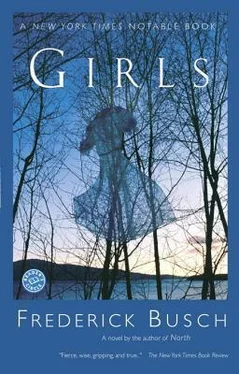Rosalie said, “Shit. I guess I have to go with them.”
“I’ll catch you later on.”
“Please do,” she said. She got out of her car and hauled her briefcase up to her rescuers.
A minute later, behind the wheel, I made a few noises about how my chest felt when I breathed or moved. I rubbed my face and nudged the fingers and made the sounds again. I’d been talking to the dispatcher about a wrecker for Rosalie’s car, and she said, “Say again, Jack? Over.”
“Pissing and moaning is all. Over.”
I thought of my professor, who would probably call her Rosie, and maybe tell her what kind of killer I’d been for the Phoenix Project, or how I was this wonderfully naïve character, this rough country fellow, who came to class with essays about corpse rape and a little duck who didn’t have any feathers to protect him when the cold winds blew — not an uninteresting campus cop.
I drove north after work, to a little country road about half a dozen miles outside town, where I swung west, then south and west, on a road they kept plowed. I suspected someone on the town’s road crews lived there, among the eight houses I counted, and that was why they cleared it. I stuck the Ford as close to the verge as I could get without stranding myself, and I let the dog go out onto the frozen marshy edge of the big lake. Dead reeds shook in the warming winds and I heard game birds under scraggly cover begin to squawk as the dog approached, then go silent when he was on them. His tail went up and he stuck his chest out, demonstrating his savage alertness. He couldn’t see too far past his muzzle, and whatever he smelled he didn’t recognize, but we waved his brushy tale in those short, choppy strokes reserved by dogs for showing humans that they’re tracking.
I went out after him, not caring about the birds, just wanting the emptiness and the silence. The road was a good distance from the far side of the lake and no one came past where I was parked. I worked at letting my shoulders collapse under their own weight from where they’d bunched around my stiff neck. I was contemplating the last of the pain pills. I was contemplating Fanny and Janice Tanner, Rosalie, and the gun that was in my coat pocket. The dog had his face into slush and was snorting it away. I knew not to go as far out as he was, and I walked parallel to the shore, hearing the ice crack under my feet. There was a smell of something soft — I didn’t know what, but it had to do with spring. Either something was rising up from under the ice and snow and black water or something was spilling off the trees and plants. It was possible that spring would come. It might. I didn’t know. Mrs. Tanner was going to die, though. She wouldn’t see Janice. I knew that. I was certain she was dead. I wondered if one of them really had a diary she’d written.
Why not? I might have done the same if Hannah had become a girl and an almost-adolescent and sneaked away to crawl around on top of some naked man with her hands and mouth working.
You’re thinking of Rosalie, I thought.
But of course I knew that. I had known it. That was what had tipped me off. The little girlness of it. That was what he had loved. That was what had frightened me about some of my pleasure with Rosalie. I wondered what had finally scared him.
Sergeant Bird had questioned and dismissed a man in Vestal, New York, who had been accused of molesting a child. He had sworn at me for pestering him, and then he had read me a summary of the state detective bureau’s file survey: zero suspects placed on the scene. We had congratulated each other on our fine police work. And I thought that if Mrs. Tanner was going to die and not see a live child, she could possibly see the person who had killed her, if I was right. I had not told Sergeant Bird about the guess I was arriving at. I had barely told myself.
The worst I could be was wrong, I thought.
Who cares that terribly much if I take out the ugly dark handgun and put a few rounds in him and then they say I’m wrong?
The dog came back with a bright yellow wrapper from a fast-food sandwich. His tail swung slowly back and forth to signal not hunting but the hunter’s return with his prey.
“You’re brilliant,” I told him.
He agreed.
“Drop it for me.”
He deposited the wrapper on the softening ice, but he kept an eye on it. When I picked it up, he watched as I put it into my coat. I shoved it in with the pistol. I didn’t care. I wouldn’t need to draw the piece with any speed or fire it with accuracy. I was simply going to brandish it, as they say. I was going to wave it in somebody’s face until I was satisfied. Or maybe I’d just kill someone.

I expected to find her in a coma, but she was sitting up in a rocking chair in her kitchen. I’m not what you’d call a man of taste. I like light. I like to feel warm from colors. I don’t like living the way someone in a cubicle decided I ought to. But I don’t know much more. Whatever I learned about the way the larger, man-made pieces of the world fit with one another, I learned from Fanny.
Still, when I was in the Tanners’ house again, I wondered why you wouldn’t just shoot yourself or hang yourself or drive yourself into a deep lake if you worked from your adolescence on to surround yourself with what I saw. There were crocheted armrests on the rockers in the kitchen, near the stove. They were made of the kind of tan, white, gold, and black wool you can buy for not very much in the little intentionally homespun general stores you find in small upstate towns. There were braided rugs you could buy from the smaller catalogs printed on coarser paper. Imitation-brass fire tools stood near their heavy iron woodstove in a fake wrought-iron stand. Their pottery mugs did not discuss Christ, salvation, or sin, but they did sport cheerful red-white-and-blue Pennsylvania Dutch designs.
Reverend Tanner was feeding her oatmeal. She was frowning at him and flapping her hands. When she saw me, a smile changed her face, and then — like Rosalie and then like me — she covered her face with her hands the way kids do.
“You see?” she said to her husband. “You see what you’ve done? Jack might as well have caught me in a high chair.”
The reverend said to me, “I thought she might eat if I did it this way.”
“It isn’t the dying,” she said. “It’s the terrible cooking.”
“I can fry French toast,” I said. “I can make stew. Corn chowder. Some kind of a roast. I’d be pleased to try. Vegetable soup? My wife taught me how to make soup.”
Her husband nodded encouragement to her. She closed her eyes and shook her head.
“And don’t talk that dying nonsense,” he said.
She didn’t bother to answer, and he didn’t bother to say any more. He put down the crockery bowl.
“How about a drink?” I said. “How about a shot of whiskey?”
“We don’t drink,” he said. “We never drank.”
She whispered, “Maybe we should have.”
I didn’t know if she heard him talking about his own death in hers. I noticed when he stood that his belly was soft and bulging a little. His thin-looking blue shirt and feed-store dark blue gabardine pants were hard-folded, as if he’d worn them for many weeks. There were stains on his shirt and the lap of his trousers. Before he carried the bowl and long-handled iced-tea spoon to the sink, he looked around, his eyes big behind his glasses, and I thought he was trying to find where he was, or where the sink was, or the table she sat at. The shape and drift of the stains on his clothes reminded me of Randy Strodemaster’s bathrobe. The reverend was getting ready to be alone. No. He wasn’t setting himself or preparing his mind. It just was coming. It was like a storm. He knew it was almost there.
Читать дальше











